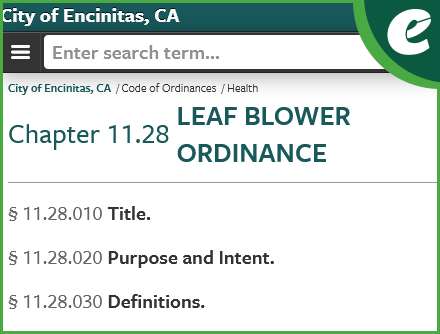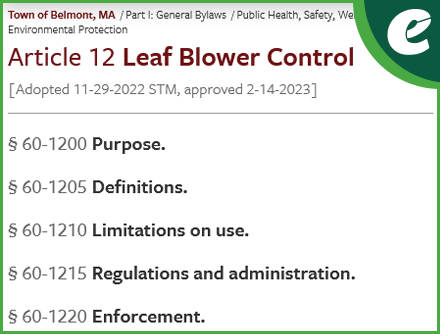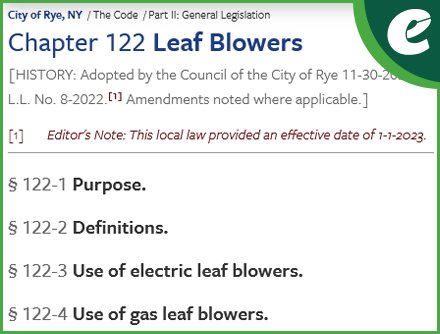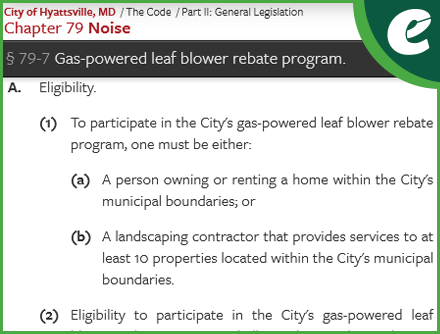For homeowners and landscapers, the leaf blower has become the tool of choice for keeping yards and work sites neat and tidy. With the ability of some models to unleash winds stronger than a category 4 hurricane, these devices make fast and easy work of clearing away leaves and debris in all seasons. Despite their popularity, leaf blowers can produce ear-piercing levels of noise. And gas-powered versions can emit toxic levels of pollutants that are harmful to humans, animals, and the planet. Many state and local governments in many areas are taking steps to address these issues by placing stricter regulations — and even outright bans — on the use of many types of leaf blowers.
View sample leaf blower legislation >
From farm work to yard work
The first leaf blowers in the U.S. date back to the 1950s where large and bulky blower devices were used for agricultural purposes. As residential areas expanded and the desire for well-maintained lawns grew, leaf blowers became increasingly popular as a tool to make the job faster and easier. Over the years, leaf blowers have become smaller and lighter and can now be easily operated by a single person. Today there are also gas and electric blower versions, with the gas-powered option typically more popular due to its portability and increased blowing power.
The pervasive use of leaf blowers
Forestry.com cites that approximately 11 million leaf blowers are in use in the United States annually. While they are primarily used for clearing fall leaves, users are finding other ways to put them to work year-round from clearing job site debris, to unclogging gutters, to blowing fresh fallen snow off vehicles and sidewalks.
According to BobVila.com, almost 2.2 billion gallons of fuel are used on lawn care each year, which is the equivalent of powering millions of homes for a year. Gas-powered leaf blowers are powered by two-stroke engines which can be particularly damaging to the environment. Research has shown these machines emit high levels of carbon monoxide and non-methane hydrocarbons, both of which contribute to the breakdown of the Earth’s fragile ozone layer.
Gas-powered leaf blowers outnumber electric models
Even with their negative effects, gas-powered leaf blowers continue to be extremely popular among landscaping professionals and homeowners. The pros say that electric leaf blowers don’t work as well as gas-powered ones, which means reduced efficiency for landscapers. In addition, landscaping companies say they often don’t have enough employees to meet demand, and one worker with a gas-powered leaf blower can do the work of two workers equipped with rakes and other manual tools.
Some homeowners also like gas-powered leaf blowers saying they get the job done better and faster because they have more power. Battery-powered versions can create air flows of about 500 Cubic Feet per Minute (CFM) and gas-powered versions put out 1,200 CFM or more. Plus, gas leaf blowers aren’t limited by a cord or battery power.
The hidden costs of a leaf-free lawn
As leaf blowers make our lives easier, their operation can significantly disrupt natural ecosystems. Many small animals depend on leaves for survival. And this natural debris serves as a crucial habitat and food source for various insects and microorganisms. Displacing or removing leaves can seriously alter the biodiversity of our ecosystems. Moreover, the widespread use of leaf blowers has increased noise pollution. The high-decibel noise generated by these machines not only affects humans, causing stress and hearing issues, but also has a detrimental impact on wildlife, interfering with their communication, breeding, and natural behaviors.
The debate is swirling
Today, the use of leaf blowers is at the center of a significant debate that encompasses both environmental and economic dimensions. The environmental impact of leaf blowers, especially those powered by gas, has led to increased calls for regulation or outright bans in many areas. The debate also considers the economic implications for landscaping professionals. Leaf blowers are a staple in the landscaping industry and restrictions or bans on these tools could have a substantial impact on the operations and financial viability of landscaping businesses. This ongoing discussion highlights the need for a balanced approach that addresses environmental concerns while also considering the economic realities faced by those in the lawn care industry.
See a list of states and municipalities that restrict or ban leaf blowers >
Change is blowing in the wind
A shift in public consciousness regarding the negative effects of leaf blower use has been instrumental in driving regulatory changes across the United States. As a result, over 200 municipalities have now implemented various restrictions on the use of leaf blowers. These legislative actions have been significantly influenced by the efforts of advocacy groups such as Quiet Communities, which have been at the forefront of raising awareness about the adverse effects of noise pollution and championing the need for more environmentally friendly practices in lawn and garden maintenance. These changes have also sparked a broader conversation about sustainable practices in lawn care and garden maintenance. They encourage individuals and professionals alike to explore alternative methods that are more in harmony with the environment. Options such as electric leaf blowers, manual raking, or even leaving the leaves to naturally decompose and enrich the soil are considered viable and eco-friendly alternatives.
Useful examples of leaf blower legislation from the eCode360® Library
If your community is interested in enacting leaf blower legislation, here are some useful examples that can be found in our eCode360 Library:
Updating your municipal code is vitally important
Did you know you can set up a regular update schedule, so you don’t have to worry about compiling materials or taking up time and resources of your staff to do the updates yourself? As your municipality passes legislation, send it to General Code and we’ll take care of the rest. It’s just that simple!
For tips that will allow us to process your code updates most efficiently, click here.
Questions about updating your code?
Our Client Care team is available to explain the options and benefits of scheduled code updates or any other code-related questions you might have.
Sources:
- Forestry.com: The Environmental and Health Impact of Leaf Blowers: A Call for Change
- USAToday: Gas leaf blowers and lawn mowers are shockingly bad for the planet. Bans are beginning to spread.
- USAToday: Time to ditch your gas-powered leaf blower—here’s why
- Audubon: Why Cities are Taking Action to Limit Loud, Polluting Lawn Care
- BobVila.com: The War on Leaf Blowers: Why Some Communities Are Up in Arms Over the Loud Lawn Tools
- The Atlantic: The ‘Public Health Menace’ of Fall in America
- Moms Clean Air Force: Leaf Blowers and Our Children’s Health
- Common Dreams: The Problem with Leaf Blowers
- Leaf Blowers Guide.net: History of Leaf Blowers
- The Washington Post: The Problem with Gas-Powered Leaf Blowers
- Business Insider: More US cities and towns are slapping limits –or even bans—on gas powered garden tools…






